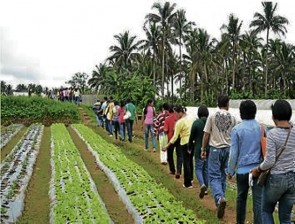Farmlands are also for tourists

TOURISTS on a sightseeing of vegetables at Costales Nature Farm, a sustainable organic farm in Majayjay, Laguna. PHOTO COURTESY OF COSTALES NATURE FARM
LOS BAÑOS, Laguna—Parks of natural wonders and ritzy resorts offering a wide variety of relaxation services may find new players in tourism sprouting from the field of agriculture.
Academic and tourism experts are tapping the potentials of “agritourism” to alleviate poverty and promote agriculture courses in schools and universities.
Dr. Rico Ancog, an assistant professor at the School of Environmental Science and Management in the University of the Philippines Los Baños (UPLB), however, said “we cannot maximize its great potentials” because a bill aimed at institutionalizing agritourism is still pending in Congress.
Around 100 people from the agritourism industry, academe, research and development, and farmers’ organizations joined the first National Agritourism Research Conference held at the Southeast Asian Regional Center for Graduate Study and Research in Agriculture (Searca) in Los Baños town in Laguna.
Loose community
The conference sought to consolidate the “currently loose agritourism community,” said Dr. Gil Saguiguit Jr., director of the host Searca. It ended on Friday.
Ancog described an agritourism facility as a productive farmland open to visitors who wish to experience or participate in farm production. He cited as examples the leisure farms in Batangas, the mango farms in Guimaras, and the rice farms in Bacolod City and Negros Occidental, which cater to Japanese exchange students.
In some parts of Cavite, Batangas and Laguna provinces, agritourism is practiced by leasing land for a period of time so that tourists can grow and harvest their own produce, he said.
“It has already been there since the ’90s, only that it’s not institutionally defined,” Ancog said. Most of the agritourism farms, he added, are privately owned or managed.
In 2002, the Department of Agriculture (DAR) and the Department of Tourism (DOT) issued a joint circular that identified 10 agritourism sites in the country. One of them is the Costales Nature Farm in Majayjay town in Laguna.
Pending bill
In 2010, Camarines Sur Rep. Diosdado Arroyo filed House Bill No. 1808 or the Agri-Tourism Promotion Act, which calls for a “clear-cut national policy” to promote agritourism.
Dr. Miguela Mena, dean of the Asian Institute of Tourism at UP Diliman, said the Philippines was looking at models of agritourism farms in Japan, Thailand and other countries in Southeast Asia.
“Farmers’ income here is seasonal. (Based on) researches in other countries, (agritourism) is seen as an alternative source of income. It can augment (the income of Filipino farmers),” Mena said.
Helping farmers
One problem, however, is the lack of an extensive promotion of agritourism in the Philippines. “When you say tourism, it usually (refers to) beaches, nature or ecofarms. (Agriculture) is not a highly promoted tourism product yet,” Mena said.
She urged local government units to support the developing farms. Otherwise, “any effort (to promote agritourism) will be useless,” she said.
Citing data from the Asian Development Bank in 2010, Ancog said some 33 percent of Filipinos were directly or indirectly employed in agriculture, while nine percent were in industries and the rest in the service sector.
“(Agritourism) doesn’t need to sacrifice farm production but rather complements it by bringing in additional income,” Ancog said.
He explained that agritourism could also address the declining enrollment in agriculture courses. At the UPLB College of Agriculture, enrollment drastically dropped from 51 percent in 1980 to 43 percent in 1995, and to only 4.7 percent this year.
Agriculture Undersecretary Segfredo Serrano underscored the hospitality of Filipinos as an asset in promoting agritourism.
“The strength is how people in the rural area receive people. They may be poor but the way they receive people is something (and) we should tap into that part of our culture and attitude,” Serrano said.
Lettuce is among the vegetables harvested at the Costales Nature Farm, a sustainable organic farm in Majayjay, Laguna, which is one of the 10 sites identified by the DAR and the DOT as an agritourism destination in the Philippines. The farm offers day-tour and overnight-stay packages to tourists.














